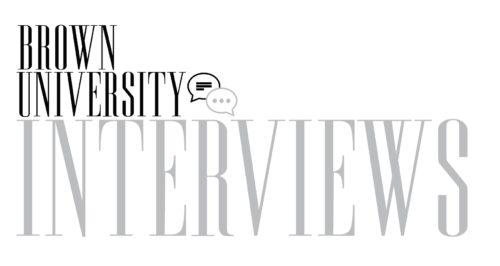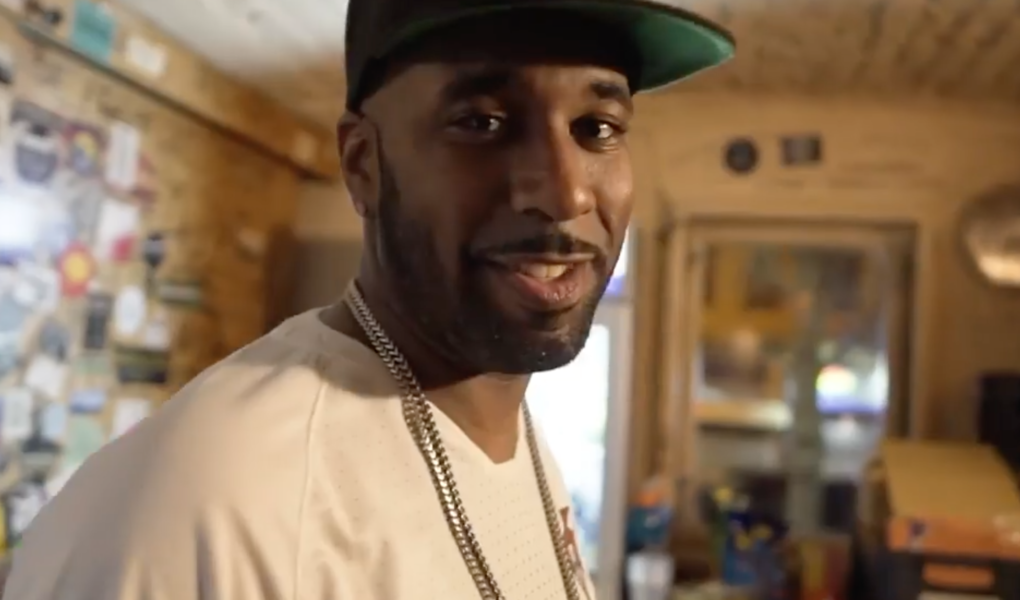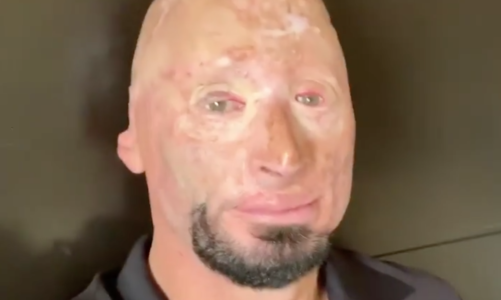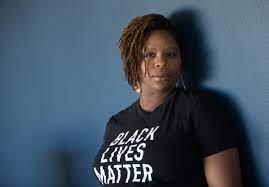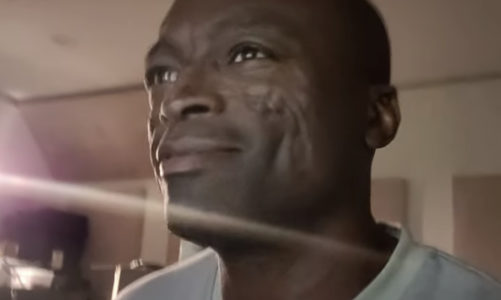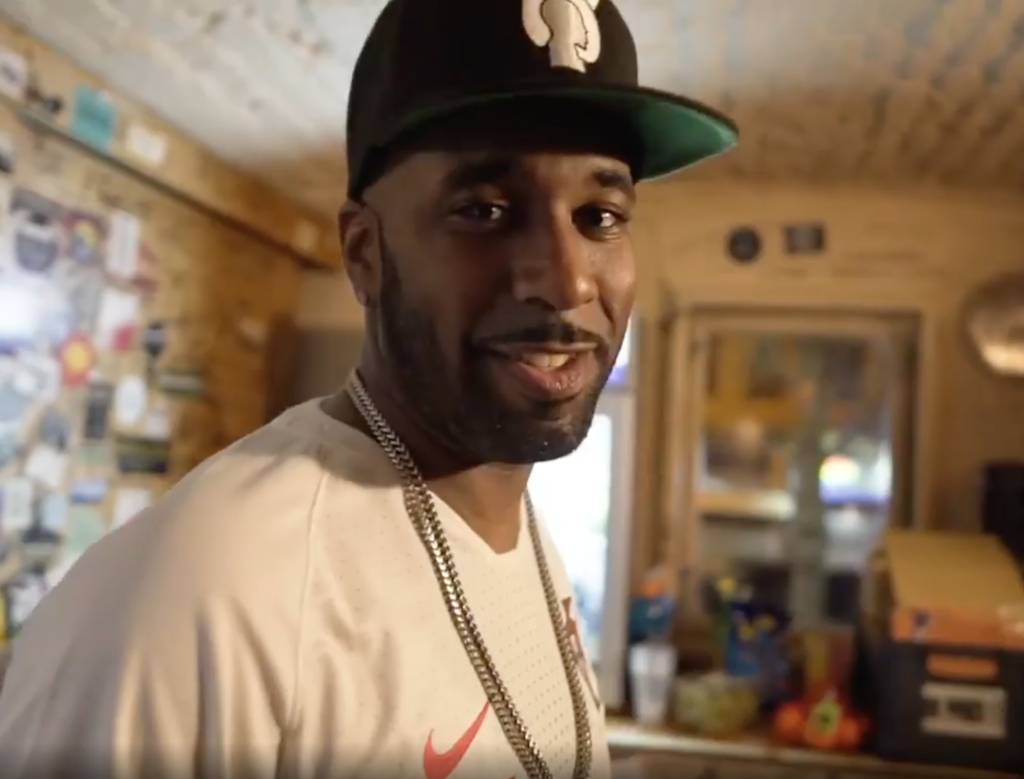
Yonas Mellesse, better known to fans around the world under mononym YONAS, is a leading independent hip-hop artist. Growing up in the South Bronx, he used classical music to cope with the death of his father and ensuing financial hardship. YONAS dedicated himself to the violin starting at the age of five and was training at the Julliard School by 13. He switched his focus to hip-hop in high school and quickly distinguished himself as a rising star when his first single, “Banga” won a Billboard Songwriting Award. Now a supernova, YONAS has accumulated over 250 million digital streams from his three albums, three mixtapes, and four EPs. He has performed with Macklemore & Ryan Lewis, Wale, Juicy J, Gorilla Zoe, The White Panda, and Logic, among others.
*A version of this interview was originally published in the Brown Political Review.
Amelia Spalter: You are known for being an unconventional artist and for being from New York City. How did that work out when you moved to a quiet suburb in Virginia to raise a family?
YONAS: I’m about to move back to New York for a little bit, because I love the imperfections that this city holds. That is a huge reason I got into music in the first place, is to talk about those imperfections, how that makes us who we are, and gives us our life and our pulse. Now I’m in the most perfect place you could imagine, and it bugs the shit out of me.
The mailman could come to my house, drop the wrong mail off, and when I tell him he’d be like, “Oh, is this not your mail? Sorry, sir.” And just take it back and continue down the block. In New York City he’d be like, “Fuck you. Figure out whose mail it is.” The suburbs are too perfect, and it weirds me out. I’ve got to get back to the roots that got me into music in the first place, and they are in the imperfections the city holds.
I’m guessing you’re a talked-about figure in your little town in Virginia.
Oh yeah. They all know about my career. My daughter Riley’s school plays my music for the kids. Because the teachers there are all a bunch of young women who probably go out to the clubs and hear my stuff. But it’s ridiculous. I’ll be like ‘Oh you’re playing that? You know… I curse.”
Your unconventionality is often said to extend beyond your professional life and into your personal life. For example, I heard your wedding was a surprise party. How did that work?
Yes. We didn’t tell the guests it was our wedding until they got there. We just thought it would put a little less pressure on us and make it more fun. But it turned out to be really stressful, because we couldn’t tell anybody. We were holding the secret down to the very last minute. Then, when our friends showed up, they weren’t dressed for a wedding. We didn’t think about that part of it.
But it was cheaper. We looked into the traditional way and I was like, “What? I ain’t spending no $40,000 on a wedding.” I’d rather put down a payment on a house or do something significant. Anything except spending that money on drinks and food for just one night.
Speaking as a fan, when you got married and had kids, I was anticipating a tonal shift further away from girls and champagne and closer to laundry and sleep deprivation. But instead, you dropped Karate Kid, which is the exact opposite.
Right. Total opposite. My wife’s saying, “What girls are you sending down to the lobby?” I was like, “Listen, this is creative license, okay?” I think that’ll come with the next phase of music that I produce and make. At all times, I’m talking about things that happened years prior. I’m still digesting things that happened to me years ago. I’m pensive like that. So, I think in about two years, three years, she’ll finally start getting some songs.
How well can people get to know you personally through your music?
I leave it up to the listener to gauge how much they feel like they actually know me. I try to be as vulnerable as possible, but at the same time, there’s always that thing in the back of your mind saying, “Don’t say that, you shouldn’t put that out there.” Which can be a bit of a hindrance. There’s a firewall that blocks 100% transparency and I think it’s an artist’s journey to try and figure out how to knock that down.
Does knowing your daughter will hear your music as she grows up affect what you put in your lyrics?
Everything I write is reality. This is my real life. If I said something happened, then that happened. There are people that exaggerate things and dramatize the way that they write about themselves to the point where it’s almost about some fictional character that they’ve created in their mind. I don’t have that problem, so I don’t think I’ll ever have to have that conversation with her.
Yah, you’ll never get any questions you can’t answer, like, “Dad, where have you been parking this Maserati?”
Exactly. Instead I talk about my ambition to one day purchase a Maserati. It’s comforting knowing that I’ve never had that issue. If I did, I would probably just say, “Look, music is entertainment, like how you watch movies. Tom Cruise is not hanging from the side of that building for real.”
Luckily for me, everything is 100% authentic. But that leads to a different conversation. Because, if I talk about a bad experience, it’s something I really went through. So I might have to say, “This happened in Dad’s life, and hopefully you learn from it, so it doesn’t happen in your life.” But there are also a lot of good things where I can say “Learn from this so that it could happen to you, too.”
A whole lot of good things. Your music is resoundingly upbeat and positive, even though you’ve lived through some dark and challenging times. Where does your optimism come from?
It came from falling on my face a lot. I’m the type of person who, if you warn me that something is hot, I’ll still touch it. I don’t know why. I’m not really afraid of doing things, even when I know I should be. I learned that that sense of adventure was something that was going to serve me well in life. I’m a fan of, “It’s about the journey, not the destination.” It’s corny, it’s cliché, but when you live it, it’s real. I think that mindset reflects, not just in my music, but in everything that I do.
The process is not always as pretty and pristine as it may come off. When I’m actually sitting in the studio and writing a song, it comes with a lot of hardship, it comes with regret here and there. I think the culmination of all those different attempts to touch the fire is what allows me to say, “You know what? You should just go for it, period. Live your whole life like that.”
Your music has an interesting balance of girls, champagne, and God. What role does faith play in your creative process?
I drink champagne and then I pray “God, don’t let this girl be crazy.”
But in all seriousness, God is the foundation that lets me know whatever night I just had, whatever week, month, or year I just had, I can still wake up and say, “Today is a new beginning.” We’re all going to make mistakes, so knowing that I have that clean slate helps me continue to be myself no matter where I go.
What is a typical day on tour really like?
Two words: fucking crazy. I love performing, I just don’t like the in-between, going from city to city. I’d like to paint a pretty picture, but it’s not as glamorous as some people might think. Yah, girls and champagne, sure, that’s there. I make sure that that’s there. But it’s hard work, it takes a toll on the whole team, and you have to stay disciplined.
Sometimes you drive, like, nine hours. You’ll perform an hour set, shake hands, and get right on the road to be able to make it to the next city. You drive another nine hours, then you sleep for, like, two hours. Then you wake up and it’s a sound check. Then you try to rush back to the hotel to eat something, because we still haven’t eaten in all that time. Maybe sneak in a little nap, but then it’s stage time again. Back to back to back to back to back.
It’s worth it when you look out into the crowd and see, “Yo, someone’s literally having the time of their life.” When they’re getting exactly what they came for and they’re like, “This is the music I’ve been listening to for years.” That’s actually the best part.
Before you were a rapper, you played violin. How does that classical foundation manifest in your contemporary work?
I think the violin is the very reason I make music. The violin gave me my ear to hear and create melodies. But when I was younger, I hated it. Truth be told, I smashed three different violins… Sorry, mom.
It’s a very frustrating instrument to try to conquer, especially at that age. You’re practicing four or five hours a day on top of homework and responsibilities you might have going on. I was like, “This is torture. It is child labor. There’s got to be some law against this.” And your friends are doing much cooler things, like playing sports and all that. But violin taught me discipline from the age of five. Now I can sit in the studio for almost 24 hours sometimes and then I’ll sleep three hours and wake up and do it again.
How do you feel about music’s transition to the streaming economy?
It was always headed in this direction. People had started to use illegal means of downloading music, so I’m just glad that they were able to figure out a way to monetize it. Now artists are able to really create businesses at the same time. There’s direct distribution. Before, you had to go through a label, you had to sign contracts, and you had to give away your rights just to be able to get on iTunes and Spotify.
Ownership is key, because if the song takes off, you’re in the driver’s seat. You don’t need anyone else’s permission to place it in a movie, place it on radio; you can move forward with your vision.
It might cost you a little bit upfront, you might have to pay a producer a thousand bucks for a song to own it, but if you believe in that song then you should pay that $1,000, move forward with it, market it, make a video for it, so on and so forth, because, who knows? 10 years down the line that song might be worth a million dollars. You’ll accumulate your masters, your publishing, your videos, so when you want to retire, you can sell it. I’m selling a portion of my catalog right now. Streaming makes ownership more accessible.
You’ve said your most recent album, About Time, is one of your “most mature” projects because you focused on making individuals songs instead of making an album. How did your creative process differ through this approach?
It is equivalent to a cliché like “Don’t see the finish line before you even start the race.” I just let the music be the music. As long as you’re making music consistently, it’s going tell a story. I trusted in that process.
This song means whatever this particular song means. The next song means whatever that particular song means. I’m not going to go in with a whole concept and a white board and like, “This is gonna be my album.” No, the process was, just make the fucking song. That’s it. Build the song up, make it the best it could possibly be, think about the production, think about the lyrical content of each song, not the album as a whole. It was one of my most linear albums because of that approach. It was all-encompassing and really did tell a story because I didn’t think too much about the grand scheme of things. I thought about each individual song as it came, and that was it, making sure it was the best it could possibly be.
And no one knows of this, but there was an album before About Time, and I scrapped it. I had an entire album. I was thinking way too much about the grand scheme of it and I wasn’t focused enough on the finer details in each particular song. Shout out to Noah, he was an intern for me from NYU Tisch’s Clive Davis program. His musical inclinations were great, and we were both just like, “Let’s scrap this shit.” So we scrapped the whole album about a month and a half before it was set to go out. We created a whole new album within a few months.
Is it ever too late to start a career as a professional musician?
Not today. 10 years ago, yeah, there was definitely a threshold. I will say that the music is a young person’s sport. But in today’s atmosphere, you can do whatever you want. You can start a business tomorrow and create and distribute music on your own. You’ve got TuneCore, you got Ingrooves, you have the Orchard, you have Symphonic, there are all these different distribution outlets. Who’s stopping you? You might have to work a job to finance all of that, but it comes down to, “How bad do you want it?” If it’s your passion, you’ll go for it. You’ll drive Uber for 50 hours a week if you have to and write music while you’re stopped at a light. It’s never too late.
Just be ready to fight, though. It’s the wild, wild west and this shit is crazy and it’s expensive. It is so expensive, man, this shit gets crazy. But at the same time, again, how bad do want it? I encourage people to do whatever the hell they want to do if they’re ready to fight for it. Nothing’s going to come easy. It’s a cliché, but it’s true. There is no age limit, there is no limit on anything. You can do whatever the hell you want to do if you’re willing to fight.
*This interview has been edited for length and clarity.
